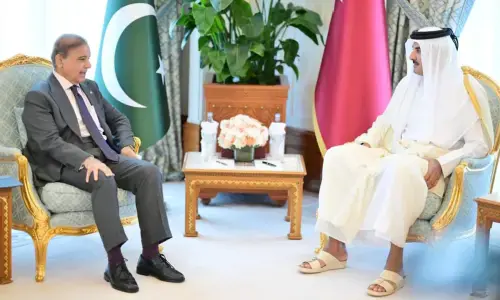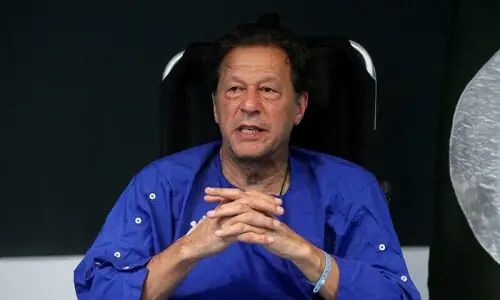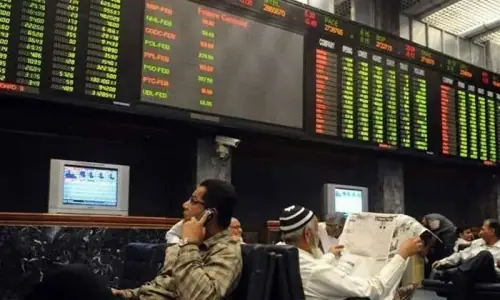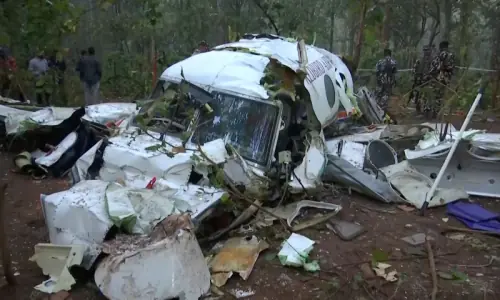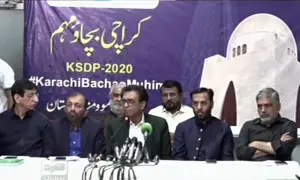The promulgation of martial law was shocking for many, including the PPP which decided to challenge it in court. What the PPP didn’t know at the time was that the seat of chief justice would now be occupied by a General Zia-friendly judge: Chief Justice Yakoob Ali Khan was swiftly replaced by Justice Anwarul Haq on Sept 20, 1977 — the same day as Nusrat Bhutto’s petition to challenge dictatorship was filed.
The constitutional petition was filed by Begum Bhutto under Article 184 (3) against the chief martial law administrator (CMLA), challenging the validity of the chief of army staff (COAS) to promulgate martial law, as well as the detention of Zulfikar Ali Bhutto and 10 other party leaders who were arrested on Sept 17, 1977 under Martial Law Regulation No 12.
The application was admitted for hearing. A nine-member bench was constituted to hear the petition; the judges included Chief Justice Anwarul Haq, Waheedudin Ahmad, Mohammad Afzal Cheema, Mohammad Akram, Dorab Patel, Qaisar Khan, Mohammad Haleem, G. Safdar Shah and Nasim Hassan Shah.
Begum Nusrat Bhutto files a petition in the Supreme Court challenging martial law, but it is dismissed; Zia’s action is justified on the basis of doctrine of necessity
In her statement, Begum Bhutto took the plea that the army chief had no right to overthrow the elected government and that all his actions were illegal. The petitioner contended that the COAS had no authority under the 1973 Constitution to impose martial law in the country or to promulgate the Laws (Continuance in Force) Order, 1977.
This intervention, Begum Bhutto argued, amounted to an act of treason as stipulated by Article 6 of the 1973 Constitution. As a consequence, the proclamation of martial law dated July 5, 1977, and the laws promulgated, were all without lawful authority. Since the martial law government had no authority, the petition said, the detention of Z.A. Bhutto and 10 other party leaders was also illegal.
The Federation was represented by A.K. Brohi, who based his arguments over the post-March election scenario. He claimed that as a result of Bhutto’s massive rigging, his government had lost whatever constitutional validity it earlier had. The ensuing widespread disturbances amounted to a repudiation of Mr Bhutto’s authority to rule and the spectre of civil war was averted only thanks to the timely action by the army on July 5.
In paragraph IX of the verdict, the court said that the true position emerging out of the facts of the case and the law applicable thereto is that the 1973 Constitution still remains the supreme law of the land, subject to the condition that certain parts there of have been held in abeyance on account of State machinery.
Senior lawyer Sharifuddin Pirzada said that Zia’s action on that day was not a coup, but was valid based on the old Roman doctrine of state necessity, as the only proper means of ousting a usurper who had illegally assumed power as a result of massive rigging.
After hearing both sides, the court delivered its verdict on Nov 10, 1977: referring to the doctrine of necessity, the court dismissed the petition, saying it was not maintainable.
The Supreme Court said that the legal consequences of an abrupt political change, by imposition of martial law, have to be judged not by application of an abstract theory of law in vacuum but by consideration of the total milieu preceding the change. The court held that the “objective” political situation prevailing at the time, its historical imperatives, compulsions, motivations of persons bringing the change and the extent of preservation of suppression of old legal order all needed to be considered.
In paragraph IX of the verdict, the court said that the true position emerging out of the facts of the case and the law applicable thereto is that the 1973 Constitution still remains the supreme law of the land, subject to the condition that certain parts thereof have been held in abeyance on account of State machinery.
The mere fact that the judges of the superior courts have taken a new oath after the proclamation of martial law does not in any manner derogate from the position as the courts had been originally established under the 1973 Constitution and have continued in their functions in spite of the proclamation of martial law. The CMLA assuming power by means of an extra-constitutional step was held to be a matter of state necessity and was deemed as being a step taken for the welfare of the people. He was now entitled to perform all acts and promulgate all legislative measures.
The verdict recalled events that took place during and after the March 7, 1977 polls, and the allegations of rigging. The verdict added that given the broken state of law and order, and the shattered economy, the CMLA took over administration for a short time to arrange for fresh elections within (the) shortest possible time.
The new arrangements dictated by consideration of state necessity and welfare of the people acquired its effectiveness owing to its moral content and promise of restoration of democratic institutions, and was therefore justified on the basis of doctrine of necessity.
Next week: Breakup of PNA
Published in Dawn, Sunday Magazine, July 6th, 2014















